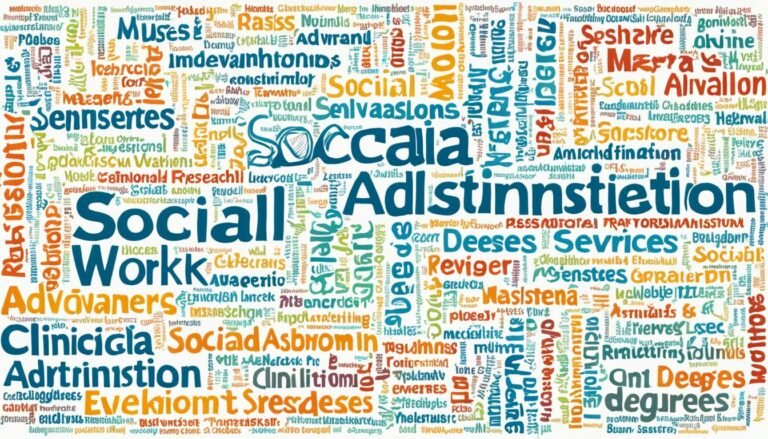Review of Health Economics Master’s Degrees
Are you aware that the need for healthcare professionals is growing fast because of the older population? This growth creates demand for those who understand health economics. A master’s in health economics can lead to a fulfilling career. You might want to study healthcare providers’ behavior, analyze policies, or promote healthy living.
Key Takeaways:
- Health economics master’s degrees provide a wide range of opportunities in the healthcare industry.
- Graduates can pursue careers as health economists, health data analysts, program managers, and more.
- When choosing a program, consider factors such as reputation, curriculum, and career goals.
- Stay updated on the latest trends in the field to ensure professional growth.
- A master’s degree in health economics equips you with the knowledge and skills to navigate the complexities of healthcare economics.
Importance of Health Economics/Public Health
Health Economics/Public Health greatly helps promote better health for everyone. It uses economic theories to study why we make certain health choices. It looks at how individuals, healthcare providers, and even governments decide on health matters.
Graduate programs in Health Economics/Public Health are offered at many universities. These programs help students become experts in health economics. They learn about economics and apply it to health systems.
It’s crucial to pick a well-known health economics graduate program. Check out their rankings to see their quality. Rankings show which schools have the best academics and faculty.
Health economics schools that rank high usually do a lot of research. They also have many connections in the field and a strong program. Picking a respected school can improve your chances of getting good health economics jobs.
Getting a degree in Health Economics/Public Health is a great step. It lets you learn to help our global health. You will study funding healthcare, making policies, and how to assess health systems.
To sum up, health economics and public health are vital for healthcare. They offer many paths for work in research, government, or with companies. Choosing the right health economics program can make you a key player in health policy and care improvement.
The Role of Health Economics in Global Issues
Health economics looks at more than just local problems. It helps deal with big worldwide challenges. At Johns Hopkins Bloomberg School of Public Health, they have a special degree program. This program combines health economics with important global topics like migration, climate change, and how to get vaccines to everyone. It helps students learn how to make global health policies and decisions using economic and public health skills.
Online health economics master’s programs let students study when it fits their schedule. This is great for anyone juggling a lot. These programs come in different shapes and sizes. It’s smart to look at reviews from students to learn about the quality of education and the job opportunities a program offers.
Checking out the courses in health economics master’s programs is important. Each program covers different topics. This helps students make sure the program matches their career goals and what they find interesting. Choosing a program with a solid curriculum is key. It ensures graduates have the skills they need in the health economics field.
Being good in global health economics takes a mix of skills. You need to use economic ideas, analyze policies, and think about public health. Health economists are important for making real changes worldwide. The world needs more experts in health economics to tackle big health issues. Getting a health economics master’s can lead to exciting jobs in the government or business.
Job Opportunities in Health Economics/Public Health
If you’ve earned a master’s degree in Health Economics/Public Health, you’re in for a treat. There are many paths to follow, from analyzing health data to designing health programs. Let’s dive into the job opportunities you can find:
Health Economists
Being a health economist means you’ll look at data about healthcare. You’ll use economic ideas to check out healthcare policies. Your work will include studying if healthcare programs are worth the money, seeing how well they work, and finding out their effect on health trends. Lots of places need health economists, from schools to big companies.
Health Data Analysts
In this job, you’ll gather and look at health data to see patterns and gain insights. You’ll handle big sets of data and use math to understand and report your findings. Health data analysts are important in making sure healthcare decisions are based on the facts. You might work for healthcare groups, insurance companies, or in research.
Health Program Specialists
If you’re a health program specialist, you’ll put into action public health programs. This could be in areas like stopping sickness, encouraging health, or making communities healthier. You’ll make plans, team up with others, and check how well your programs work.
Project Coordinators
Project coordinators help with all kinds of healthcare projects. This could be anything from medicine tests to health awareness efforts. You’ll make sure everything stays on schedule, manage the money, and work with different groups. You’re in charge of making sure the projects finish successfully and on time.
Community Engagement Specialists
Community engagement specialists bring healthcare groups and the public together. Your job is to make strong connections and get people in the community to join health efforts. You play a big part in fighting unfair health differences, pushing for health fairness, and making health better for everyone in the area.
Behavior Health Strategic Initiative Specialists
These specialists focus on improving mental health in people and communities. They plan and carry out strategies to meet mental health needs, fight against stereotypes, and make it easier to get mental health help. Working with health workers, community groups, and lawmakers, they aim to make real changes.
Public Health Intelligence Specialists
Public health intelligence specialists are all about health data. They collect and study it to support public health efforts and rules. By being good at organizing data and studying it, they can spot health trends, watch out for outbreaks, and see how well public health actions are doing. These specialists might work in government, research, or health care.
Clinical Services Officers
Clinical services officers make sure healthcare is top-notch for patients. They’re in the middle of hospitals and clinics, working with health care providers and leaders. Their job is to bring the best health ideas to life, make health services run smoothly, and help patients get better.
Relief Support Workers
Relief support workers are there to help in healthcare spots where they’re needed. They can work with older people, those with disabilities, or folks going through tough times mentally. Their job is to care for these people, give them emotional support, and stand up for their rights. It’s all about making individuals and communities healthier and happier.
The field for jobs in health economics and public health is growing. This is because people are seeing how important these areas are. If you’ve graduated from a top program in Health Economics, you’re well-placed for a successful job hunt.
Let’s now check out what’s new and exciting in Health Economics and Public Health.
Trends in Health Economics and Public Health
The world of health economics and public health is always changing. Different trends affect how healthcare works. It’s important for those in the field to keep up. Let’s look at some key trends:
Rising Controversy Surrounding Drug Pricing
Drug prices are going up, making many people worried. This situation leads to debates over if drugs are affordable and easy to get. Health economists work to make sure everyone can get important medicines.
Development of Personalized Therapies
New technology and genetic knowledge are making personalized treatment possible. Studying these treatments’ costs and effects is key. Health economists determine if these new ways are worth the investment.
Debates on the Effectiveness of Universal Healthcare Systems
People are talking a lot about universal healthcare. It’s the job of health economists to understand these talks. They look at the costs and results of different healthcare models. This helps make smart policy choices.
Challenges Posed by Aging Populations
With more people living longer, healthcare faces new tests. Health economists look into the costs and needs linked to aging. They study how health systems can best use their resources as people get older.
Focus on Making Healthcare More Accessible and Reducing Costs
Many still find healthcare too expensive. Health economics explores ways to change this. Things like telemedicine and digital health are some answers. They also look for ways to cut spending.
By staying informed about these trends, experts in health economics and public health can help create better policies. These efforts lead to improved health for both individuals and groups.
[Health Economics Graduate Programs, Health Economics Master’s Degree Rankings, Health Economics Schools]
Economic Evaluation and Outcomes Research in Health Economics
Economic evaluation and outcomes research are key in health economics. They help us see the worth and effect of healthcare steps and tech. This way, the cost and outcomes of drugs, vaccines, and health campaigns are studied. This helps in how we plan and spend our healthcare money.
Looking at the value in healthcare includes looking at both costs and benefits. This is more than just the money part. It also considers how the whole society and the health system respond. It lets us make wise choices on where our limited healthcare money goes.
Outcomes research looks at what happens with healthcare plans. It checks on the results for patients and providers. This kind of study makes use of methods to measure how well things work. It includes the patient’s thoughts and safety when looking at different healthcare options.
Both types of studies support better ways to use healthcare money. By knowing the costs and what we get from healthcare choices, leaders can choose better. They can pick things that help the most or do the best job for the money. These studies help us make our healthcare policies better and bring healthcare to more people.
“Using both economic and outcomes studies, we can figure out how well healthcare choices work. This helps make smarter spending choices in health.”
When we dig into what economic and outcomes studies show, we learn a lot. They tell us if healthcare is working well and how people feel about it. This info is key for those in charge of healthcare and for those who give and study it too.
Economic Evaluation and Outcomes Research in Practice
Consider a make-believe case where a new drug for a common illness was checked. Researchers looked at how much the drug costs and what good it does. They found out if it’s worth the money spent on it.
At the same time, another group looked at how well the new drug worked for patients. They talked to patients to see if they liked how it helped them. They collected info on how faithful patients were to taking it and how much better life got.
When we match what the money and patient parts tell us, big choices can be made. These choices are about if the drug should be used widely, paid for a lot, or how it’s given. This way of looking at things helps choose the best ways to use our healthcare money. It looks for what helps people the most and what’s best for us all.
Economic Evaluation and Outcomes Research Programs
Health economics schools teach students to be good at this kind of research. These schools give skills for making strong choices in healthcare. They get you ready to join in making healthcare decisions based on real info.
Big-name schools all over the world are known for seeing health economics in new ways and making new ideas. They offer classes that cover all you need to know about looking at the value and patient effects of healthcare plans. This helps you really help improve healthcare.
| Benefits of Economic Evaluation in Health Economics | Benefits of Outcomes Research in Health Economics |
|---|---|
| Evaluates the value and cost-effectiveness of healthcare interventions | Examines the clinical, patient, and provider outcomes of healthcare interventions |
| Informs decision-making and resource allocation in healthcare | Allows for a comprehensive evaluation of intervention effectiveness and safety |
| Optimizes the allocation of limited healthcare resources | Provides insights into patient satisfaction and healthcare quality improvements |
| Guides healthcare policies and improves overall healthcare delivery | Contributes to evidence-based decision-making and improved patient outcomes |
Faculty Research in Health Economics
In the world of Health Economics, faculty members are key. They are always pushing the field forward. Their work looks at healthcare systems, making them better, and how to smartly use resources. They look at how health insurance and services help shape our health. And they share what they find with people who make rules and professionals.
This knowledge helps make healthcare more fair and work better around the globe. They help governments make choices with solid facts. This leads to better health care planning and spending. Their advice is valuable for making the most of resources in health care.
Grad schools and schools in Health Economics value their staff a lot. They think they bring solutions to tricky health problems. With a lot of hard work, these experts aim to make health care services and their results better.
Research Focus Areas in Health Economics:
- Economic analysis of healthcare systems
- Cost-effectiveness and cost-benefit analysis
- Health insurance and healthcare financing
- Health disparities and equity
- Behavioral economics in healthcare decision-making
- Value-based healthcare
- Technology assessment and health outcomes evaluation
- Healthcare policy and reform
“Faculty research in Health Economics plays a crucial role in driving innovation and improving healthcare systems. By addressing pressing issues such as cost-effectiveness and equity, their contributions have far-reaching impact.”
Professors have hands in researches, talk with other experts, and work with students. Their work helps Health Economics programs remain top-notch. It’s because of their dedication that these programs are always improving.
Students get inspired by how their professors go all out in research. They can join in, get advice, and add to what we know about Health Economics. This close link helps everyone, especially students, learn more and do better in the field.
The Importance of Faculty Research:
Research by professors makes learning more real and current. It helps students think deeper, solve problems better, and stay updated on health care news. This makes their education very practical and sound.
Also, students get a chance to meet and work with top researchers. This networking might bring opportunities for jobs, more research chances, and new steps in their health care careers.
Faculty Research – Shaping the Future
Faculty members in Health Economics are shaping tomorrow’s health care. Their work guides big decisions in policy and health management. This means better health for us all and care that’s more focused on our needs.
| Benefits of Faculty Research in Health Economics | Examples |
|---|---|
| Improved utilization of healthcare resources | Research determining optimal allocation of healthcare funding to maximize impact and efficiency |
| Enhanced healthcare policies | Studies influencing policy decisions regarding health insurance coverage and public health initiatives |
| Informed decision-making | Research providing evidence-based insights for healthcare providers, policymakers, and administrators |
| Reduced health disparities | Research identifying and addressing disparities in healthcare access and outcomes among different population groups |
| Effective healthcare interventions | Studies evaluating the cost-effectiveness and impact of new healthcare technologies and interventions |
| Sustainable healthcare systems | Research promoting efficient resource utilization and long-term viability of healthcare systems |
Faculty research in Health Economics is a force for good. It helps not just individuals but whole communities. By sharing new knowledge, graduate programs help students become real assets in health care. They prepare students well for future health care challenges.
Application of Health Economics in Public and Private Sectors
Health economists are key in making choices for public and private health. They use economic theories to look at the healthcare system. This includes how it’s run, how well it works, and who has access to it. Their goal is to find ways for healthcare to be fair and not too expensive.
They also decide how much new health tech and treatments should cost. They think about the price, how well it works, and what it means long-term. This makes sure healthcare is priced fairly and can be used by everyone easily.
Health economists help make rules to keep the healthcare market fair. They check out how the market works to avoid unfair prices and access. Doing so makes room for new ideas and keeps the healthcare system fair for everyone.
Health economists look for the best ways to spend money on healthcare. They study the data to see how to use money effectively. This leads to better health results without wasting resources.
They also study how different people in healthcare are motivated. This could be doctors, insurance companies, or government leaders. By knowing what makes them work, health economists can suggest ways to work together. This helps healthcare improve for everyone.
So, health economists are a big part of making healthcare fair and effective. They help with making and following rules and using money wisely. Thanks to their work, healthcare tries to be better for everyone.
Conclusion
A Master’s Degree in Health Economics/Public Health opens many doors in healthcare. It teaches grads the skills needed to handle healthcare economics. This makes them very useful in the field.
When choosing a program, look at their status, what they teach, and if they fit your career goals. It’s also important to keep learning about new trends and research in health economics. This field is always getting better at solving healthcare challenges. Keeping up with changes and progress helps professionals stay ready for future jobs.
Getting a master’s in health economics helps start a great career. Grads learn how to use healthcare resources well and fairly. With knowledge from the best programs, they can really change the healthcare industry for the better.
FAQ
Q: What are the job prospects for graduates with a Master’s Degree in Health Economics/Public Health?
A: After earning a Master’s in Health Economics/Public Health, you have several paths open. You can work as a health economist, data analyst, or program specialist. Other options include becoming a project coordinator or a community engagement specialist.
Q: What are the trends in the field of Health Economics and Public Health?
A: In Health Economics and Public Health, trends are always changing. Right now, big topics include drug price arguments and personalized therapies. There’s also talk about universal healthcare and how we’ll handle our aging populations.
Q: How does Health Economics contribute to the allocation of healthcare resources?
A: Health Economics mixes economy with health to decide how to share resources. It shows if health technologies are worth it and if they save money. This field is key to using our resources fairly and the best way.
Q: What research areas do faculty members in Health Economics focus on?
A: Teachers in Health Economics look at how health and insurance affect our choices. They advise governments on how to spend well. Their goal is to help us live healthier by using resources wisely.
Q: What are the application areas of Health Economics in the public and private sectors?
A: Health economists help make choices, both in public and private jobs. They look at healthcare’s efficiency, fairness, competition, and rules. They check new tech’s costs and make sure we spend wisely and fairly.
Q: What factors should be considered when choosing a graduate program in Health Economics/Public Health?
A: Picking a Health Economics/Public Health program means looking at its rank and what you’ll learn. Think about how it fits your career plans. These factors are key when choosing where to study.
Source Links
- https://www.best-masters.com/ranking-master-health-economics-public-health.html
- https://publichealth.jhu.edu/academics/academic-program-finder/masters-degrees/master-of-health-science-in-global-health-economics/what-is-health-economics
- https://publichealth.jhu.edu/academics/mhs-in-health-economics-and-outcomes-research







